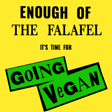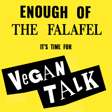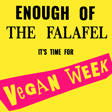
221- Does the animal rights movement need a reboot?
Project Phoenix (https://www.project-phoenix.org.uk/about) want to "build the power of the animal freedom movement in the UK into an unstoppable force for change". Hard to disagree with that. What is perhaps more controversial are their assertions that what has been lacking until now has been cohesion and collective power. In this episode, Julie, Dominic, Mark & Ant discuss whether the movement has lost its edge, and indeed whether it is even possible to organise a bunch of vegan activists!
In the discussion we refer to the following article: https://projectphoenixuk.substack.com/p/have-we-lost-our-nerve-as-a-movement
As ever, we love hearing your views on the topics under discussion (or anything else!) so do drop us your thoughts via enoughofthefalafel@gmail.com
*************
Enough of the Falafel is a community of people who love keeping on top of the latest news in the world of veganism & animal rights. With the Vegan Talk podcast, we aim to develop listeners' (& our own) thoughts around key issues affecting veganism & the animal rights movement; giving our opinions, whilst staying balanced; remaining true to our vegan ethics, whilst constantly seeking to grow & develop.
Each week we home in on one topic in particular and pick it apart in more detail. If you have a suggestion for a future show, do get in touch via enoughofthefalafel@gmail.com.
*******************
Thanks everyone for listening; give us a rating and drop us a message to say "hi"; it'll make our day!
Mark, Julie, Dominic & Anthony


